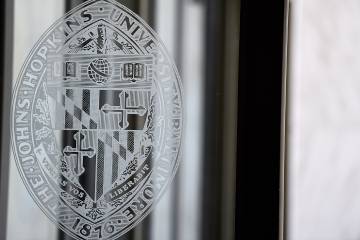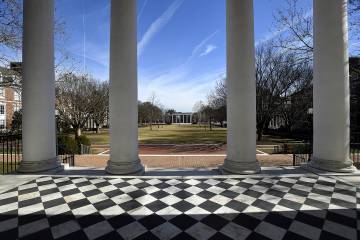A new committee is developing guidance to help shape decisions about whether and how to alter the names of existing facilities, professorships, scholarships, fellowships, and programs associated with people whose legacies are repugnant to the values and aspirations of Johns Hopkins University and Medicine.
The Committee to Establish Principles on Naming is working to develop institutional-level procedures for evaluating renaming requests, which could then be applied to specific cases by decision-makers at the divisional level. The committee's creation was announced this summer alongside several initiatives aimed at deepening the institution's commitment to building a diverse, equitable, and inclusive community.
The committee will not take up specific renaming requests, nor will it develop criteria for future naming decisions—those decisions will remain with the Office of Development and Alumni Relations, the boards of trustees of Johns Hopkins University and Medicine, and relevant school or divisional leadership. However, the committee will share with those entities its final report, which is expected to be issued this spring.
"In recent years, our institution and its divisions have taken steps to contextualize rather than erase these parts of our history," JHU President Ronald J. Daniels and Provost Sunil Kumar wrote in a message to the Johns Hopkins community in July. "As we've acknowledged previously with regard to Johns Hopkins President Isaiah Bowman (1935-48), a leading scholar and government adviser who was also an avowed racist and anti-Semite, it is critical that we confront our past as we seek better and more just decisions for our community and our society."
Among the questions before the committee is how to acknowledge the contributions of individuals in Hopkins' history without excusing conduct regarded as repugnant. With that in mind, the committee is undertaking a deliberative process for developing thoughtful principles and procedures for considering whether to rename a building or program, or to keep a name in place while contextualizing its use without losing sight of the lessons of the past.
Input is being sought from the Hopkins community throughout this process. The committee will hold two listening sessions this fall for both the Homewood and East Baltimore campuses, with specific dates announced in the coming weeks. A draft report will be shared by the end of the semester, with comments sought both electronically and through additional listening sessions in January and early February. A final report will then be submitted for approval by both boards of trustees at their meetings in early March. To follow this progress, visit to the committee's website for updates.
The members of the committee are:
- Co-Chair: Anthony (Tony) Anderson, Vice Chair, Johns Hopkins University Board of Trustees
- Co-Chair: Karen Horton, Professor of Radiology and Radiological Science Director, Russell H. Morgan Department of Radiology and Radiological Science Johns Hopkins Medicine
- Co-Chair: Lawrence Jackson, Bloomberg Distinguished Professor of English and History, Krieger School of Arts and Sciences
- Colleen Barry, Fred & Julie Soper Professor Chair, Department of Health and Policy Bloomberg School of Public Health
- Sherri-Chanelle Brighthaupt, Postdoctoral Fellow Bloomberg School of Public Health
- Arthur L. Burnett II, Professor of Urology and Oncology; Director, Basic Science Laboratory in Neuro-urology School of Medicine
- Katrina Caldwell, Vice Provost for Diversity & Inclusion and Chief Diversity Officer, Office of the Provost
- Eliot Cohen, Dean and Robert E. Osgood Professor of Strategic Studies School of Advanced International Studies
- Nathan D.B. Connolly, Herbert Baxter Adams Associate Professor of History, Krieger School of Arts and Sciences
- Renee Chenault Fattah, Johns Hopkins University Trustee
- Jeremy Greene, William H. Welch Professor of Medicine and the History of Medicine; Director, Institute of History of Medicine, School of Medicine
- Allen Kachalia, Senior Vice President, Patient Safety and Quality Director, Armstrong Institute for Patient Safety and Quality, Johns Hopkins Medicine
- Jeffrey Kahn, Robert Henry Levi and Ryda Hecht Levi Professor of Bioethics and Public Policy at the Bloomberg School of Public Health; Andreas C. Dracopoulos Director, Berman Institute of Bioethics
- Christopher Morphew, Dean, School of Education
- Margo Peyton, Graduate Student and Hugh Hawkins Research Fellow, School of Medicine
- Hanna Pickard, Bloomberg Distinguished Professor of Philosophy and Bioethics Krieger School of Arts and Sciences and the Berman Institute of Bioethics
- Jennifer Nickoles, Vice President for Operations and System Integration, Johns Hopkins Health System
- Admiral Gary Roughead, Johns Hopkins University Trustee
- Charlie Scheeler, Johns Hopkins University and Johns Hopkins Medicine Trustee
- Fritz Schroder, Vice President for Development and Alumni Relations, Johns Hopkins University
- Adelle Thompson, Undergraduate Student, Africana Studies Major, Krieger School of Arts and Sciences
- James E. West, Professor of Electrical and Computer Engineering and Mechanical Engineering, Whiting School of Engineering
Posted in University News
Tagged university history









